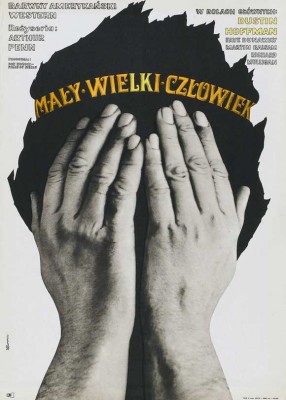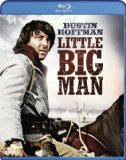| Reviews & Columns |
|
Reviews DVD TV on DVD Blu-ray 4K UHD International DVDs In Theaters Reviews by Studio Video Games Features Collector Series DVDs Easter Egg Database Interviews DVD Talk Radio Feature Articles Columns Anime Talk DVD Savant Horror DVDs The M.O.D. Squad Art House HD Talk Silent DVD
|
DVD Talk Forum |
|
|
| Resources |
|
DVD Price Search Customer Service #'s RCE Info Links |
|
Columns
|
|
|
Little Big Man
Perhaps Little Big Man was just too damn entertaining to be taken seriously. Although director Arthur Penn's French New Wave-influenced Bonnie & Clyde (1967) helped ignite the Easy Riders/Raging Bulls revolution in Hollywood, none of his subsequent films were remotely as influential. Maybe because he was older, nearly 50 when Little Big Man was made, and a former TV director to boot, so that once young upstarts like Dennis Hopper and Francis Coppola began establishing themselves, attention turned away from Penn and his art got lost in the jumble.
Whatever the reason, Little Big Man pushes all the right buttons, and for 1970 audiences it really must have been something of a revelation, at times a kick in the stomach, particularly in its depiction of the U.S. Cavalry as bloodthirsty murderers and the parallels it draws between the genocide of the American Indian and concurrent events in Vietnam, the My Lai Massacre particularly. Twenty years later Kevin Costner, attempting to fashion himself as the new Gary Cooper, directed and starred in Dances with Wolves, a commercial smash and Best Picture winner, but except for John Barry's memorable film score, there was nothing in that picture that hadn't been done better and before in Little Big Man.
Like the April 2003 DVD, CBS-Paramount's new Blu-ray of Little Big Man is sorely lacking in extra features, though the 1080p HD transfer is generally good, with strong color and a significantly improved image.
In present day (i.e., 1970), 121-year-old Jack Crabb reflects on his colorful life, initially drawing the ire of the American Indian historian (William Hickey) there to interview him. The historian isn't interested in hearing "tall tales" of Crabb's adventures. Sensing perhaps the younger man is genuinely interested in learning about the real West, Crabb tells the historian to turn his reel-to-reel tape recorder on and shut up.
One hundred and eleven years earlier, when Crabb was ten years old, his family's wagon train was wiped out by Pawnee; only he and big sister Caroline (Caroline Androsky) survived. A Cheyenne warrior, Shadow That Comes in Sight (Ruben Moreno), discovers and takes them back to his tribe. Caroline sneaks off that night, but the Indians - "human beings" (as opposed to the white man) - happily adopt Crabb, who becomes the favorite of Old Lodge Skins (Chief Dan George), and eventually Crabb is given the name Little Big Man.
About six years later, Crabb (now played by Hoffman) is captured by U.S. Calvary troopers and embarks on his "religious period" as trustees of orthodox Reverend Silas Pendrake (Thayer David) and his sexually-repressed wife, Louise (Faye Dunaway). Eventually disenchanted, Crabb then apprentices under snake-oil salesman Merriweather (Martin Balsam), an undefatigable shyster who doesn't let the gradual destruction of his body by angry customers (he gets "whittled down, kinda gradual," explains Crabb) dampen his spirit.
Reunited with Caroline, now a hardened, Annie Oakley-type, Crabb becomes a would-be gunslinger but looks ridiculous alongside Will Bill Hickok (Jeff Corey, in a striking portrayal). Crabb tries his hand at respectability, running a general store and marrying Swedish immigrant Olga (Kelly Jean Peters) but that ends disastrously, too. When she's kidnapped by Cheyenne, devoted husband Crabb goes looking for her, winding up as a muleskinner for vain General Custer (Richard Mulligan) and his 7th Cavalry.
Little Big Man impresses in almost every scene. Dunaway's are the film's only weakness. They're conceptually sound but she's miscast, overplays the part, and looks contemporary in otherwise authentically period surroundings. That period is vividly captured in little ways, like Crabb's fascination with an ornate elephant head spigot at a general store's soda counter.
The rest of the picture is densely innovative, clever, and often surprising, from Dede Allen's intriguing editing choices to John Paul Hammond's bluesy score. Adapted by Calder Willingham (Paths of Glory, The Graduate) from Thomas Berger's 1964 novel, it expands upon shifting attitudes toward Native Americans well underway before this, in movies like Broken Arrow (1950). In this case, however, the nobility of the Indian is chiefly used to contrast the savagery of whites determined to scorch the earth, and the film pulls no punches in depicting their mass murder of women and even newborn babies, storming in as Custer's marching band plays "Garryowen" in the distance, perhaps consciously referencing the heroic soldiers of John Ford's Westerns. I've seen the film a dozen times over the years and these scenes are still quite difficult to watch.
At the same time, the film is fundamentally honest in its depiction of Indian culture. When, for instance, Crabb is first introduced to the Cheyenne, they treat him to boiled dog, a delicacy Crabb remembers as being "mighty tasty." It's made very clear that the characters are supposed to be speaking to one another in the Cheyenne language, even though the actors are speaking English. Crabb's Swedish wife can hardly speak English at all, but later she's seen speaking fluent, profanity-laced Cheyenne, an amusing touch.
Hoffman, during that golden period when he was delivering one astonishing performance after another, is superb throughout, his reactions to the madness of the world around him extraordinarily expressive. He's remarkable even under pounds of Dick Smith's still-impressive old age makeup. In such situations most actors would try to overcompensate for the prosthetics with broader gesturing, but Hoffman's performance as 121-year-old Crabb is entirely believable because of the way he acts almost entirely with his eyes, themselves hidden behind contact lenses.
Everyone remembers Chief Dan George's Old Lodge Skins, one of the great characters in all of Western cinema. He's wise ("the human beings ... they believe everything is alive. Not only man and animals. But also water, earth, stone. ... But the white man, they believe everything is dead"), deadpan funny ("My new snake wife cooks dog very well....The only trouble with snake women is they copulate with horses, which makes them strange to me. She say's she doesn't. That's why I call her 'Doesn't Like Horses.' But, of course, she's lying"), and possibly psychic ("I saw you in a dream my son. You were drinking from a spring that came from the nose of an animal I didn't recognize. It had two great horns, one on each side of its nose, and the water that came from its nose was full of air!"). His scenes with Hoffmann are enchanting, magical even.
Video & Audio
The 1080p Little Big Man is a significant improvement over the 2003 DVD version. The image is notably sharper, with better color and contrast throughout, though around the 1:24 mark what looks like faded dupe material is sourced for about 20 seconds. The 5.1 DTS-HD English audio has only very slight directionality. Was this ever released theatrically in anything other than mono? A French mono track is included, along with English SDH subtitles, but that's it.
Extra Features
The lone supplement is an extremely soft but technically HD trailer that takes the unusual approach of selling the film as "15 (35mm) reels" of entertainment. It doesn't work, exactly, but it certainly distinguishes it from other, more routine Westerns.
Parting Thoughts
The Blu-ray of Little Big Man falls way short in terms of extra features, but the picture gets a big boost in high-definition and the movie is a must. Highly Recommended.
Stuart Galbraith IV's latest audio commentary, for Media Blasters' Godzilla vs. Megalon (with Steve Ryfle), is on sale now.
|
| Popular Reviews |
| Sponsored Links |
|
|
| Sponsored Links |
|
|
| Release List | Reviews | Shop | Newsletter | Forum | DVD Giveaways | Blu-Ray | Advertise |
|
Copyright 2024 DVDTalk.com All Rights Reserved. Legal Info, Privacy Policy, Terms of Use,
Manage Preferences,
Your Privacy Choices | |||||||















